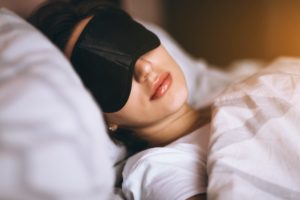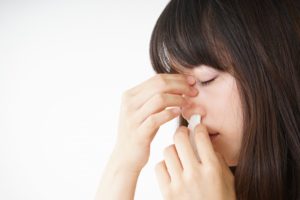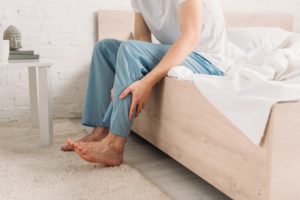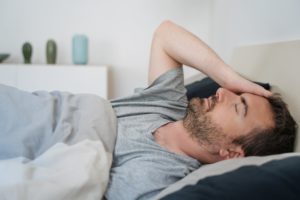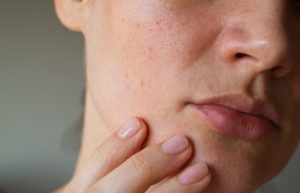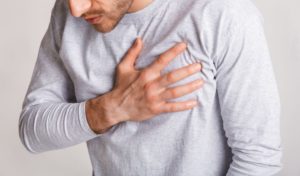How to Sleep Better with GERD
- GERD can disrupt sleep with nighttime acid reflux symptoms.
- Reflux worsens when lying down because gravity no longer helps keep stomach acid down.
- Sleeping on the left side may help alleviate reflux-related sleep problems.
- Improving sleep hygiene and elevating the head while lying down can improve sleep for those with GERD.
Acid reflux, also known as gastroesophageal reflux, describes a backflow of acid from the stomach into the esophagus. Occasional episodes of reflux are normal, but when they occur regularly, they can have serious consequences and are known as gastroesophageal reflux disease (GERD).
Most people with GERD experience an increase in the severity of symptoms, including heartburn, while sleeping or attempting to sleep. Understanding GERD, including its symptoms, causes, and treatments, can help people with this condition manage it more effectively and improve their sleep.
Is Your GERD Causing More Issues?
GERD is often linked to other sleep issues such as obstructive sleep apnea. Answer three questions to understand if you should be concerned.
What Is GERD?
GERD is a condition marked by repeated episodes of reflux that affect quality of life.
Acid reflux, also known as acid indigestion, happens when stomach acid moves up from the stomach and into the esophagus. Under normal circumstances, muscles at the bottom of the esophagus — known as the lower esophageal sphincter — act as a barrier to prevent this from happening, but if those muscles are weak or relaxed and do not close all the way, then reflux can occur.
Virtually everyone experiences reflux from time to time, but for most people, it is mild, infrequent, and goes away quickly on its own. For people with GERD, on the other hand, acid reflux typically happens at least once per week and often involves more severe and bothersome symptoms.
GERD is estimated to affect 20% of adults in the United States. While it is usually thought of as affecting adults, it can occur in infants and children as well.
What Causes GERD?
The immediate cause of GERD is the inability of the muscles at the bottom of the esophagus to block reflux of stomach acid, but other underlying elements have been found to make that condition more likely.
These risk factors contribute to the chances of developing GERD. However, not everyone with these risk factors will develop GERD, and not everyone with GERD has these risk factors.
- Obesity: GERD occurs at a higher rate in people with obesity, although the exact explanation for why this occurs is uncertain.
- Smoking cigarettes: Smoking has been found to affect the pressure near the lower esophageal sphincter and may slow the clearance of stomach acid.
- Drinking alcohol: Alcohol impacts the processes for emptying the esophagus and stomach in ways that can facilitate acid indigestion.
- Using certain medications: A number of medications can increase the risk of reflux. Speak with your doctor about your current medications and potential side effects, and only make changes to your treatment under the guidance of a medical professional.
- Hiatal hernia: In this condition, the stomach moves upward inside the body, above the diaphragm and into a position that makes reflux more common .
- Dietary choices: Certain foods and beverages are often reported to induce heartburn or reflux. Examples include chocolate, tomatoes, spicy food, vinegar, citrus, fatty foods, carbonated beverages, coffee, and mint.
- Pregnancy: Pregnant people often experience GERD, but their symptoms usually cease shortly after giving birth.

What Are the Symptoms of GERD at Night?
While the main symptom of GERD is reflux, a number of symptoms may accompany this condition.
- Heartburn: A painful burning sensation in the chest is the most common symptom of GERD, but not all cases of GERD involve heartburn.
- Regurgitation: Another common symptom of GERD is regurgitation, which means a small amount of stomach acid and sometimes bits of food come up into the mouth or back of the throat.
- Sore throat: When stomach acid rises to the mouth and throat, it can cause coughing and a feeling of choking. This often leads to a sore throat and, for some people, difficulty swallowing, known as dysphagia.
- Chest pain: On top of the discomfort from heartburn, GERD can cause radiating chest pain that can affect the neck, back, jaw, or arms and last for minutes to hours. This symptom is frequently associated with nighttime awakenings for people with GERD.
Why Is GERD Worse After Going to Bed?
When lying down, gravity no longer helps keep stomach acid down, making it easier for reflux to occur. In addition, saliva production that can usually help neutralize stomach acid is reduced during deeper stages of sleep. With less saliva, decreased swallowing during sleep reduces an important force that pushes stomach acid downward.
A combination of these effects can facilitate the leakage of stomach acid into the esophagus and allow the acid to remain in place for longer, potentially causing more severe GERD symptoms, including those that can disturb sleep. The problem may be even greater if a person goes to bed soon after eating or eats foods that trigger GERD.
What Are the Health Consequences of GERD?
Chronic reflux and GERD can cause serious complications. These include inflammation and ulcers of the esophagus, scar tissue that narrows the esophagus, spasms affecting the airway, chronic cough, damage to teeth, and exacerbated asthma symptoms.
In about 10% to 20% of cases of GERD, damage to the esophagus from stomach acid becomes a condition called Barrett esophagus. Barrett esophagus is considered to be the primary risk factor for esophageal cancer , although not everyone with the condition develops cancer.
“GERD can easily impact quality and quantity of sleep, which can translate into daytime impacts on health and performance.”
Dr. Abhinav Singh, Sleep Medicine Physician
How Are GERD and Sleep Related?
GERD is often cited as a cause of sleeping problems. In one survey of people with frequent heartburn, nearly 60% said it affected their sleep, and more than 30% said it hurt their daytime functioning.
Flare-ups of GERD symptoms after lying down can make it hard to fall asleep and can cause nighttime interruptions like heartburn, chest pain, and coughing. Studies in sleep clinics of people with GERD have found that these symptoms are correlated with lower sleep quality .
GERD and Obstructive Sleep Apnea
Research has identified a link between GERD and obstructive sleep apnea (OSA), a sleep disorder that involves blockage of the airway that incites pauses in breathing during sleep. Debate exists among experts about whether GERD causes OSA, OSA causes GERD, or if they simply share similar risk factors.
It is possible that GERD affects the airway and ability to breathe normally, causing more apneas during the night. At the same time, people with OSA wake up frequently at night and may then detect GERD symptoms. Lack of sleep from OSA may make the esophagus more susceptible to reflux.
Factors like alcohol consumption, smoking, and obesity can increase risk for both GERD and OSA, so the correlation between the conditions may be a result of these factors. While the exact relationship between GERD and OSA is subject to further research, it is clear that the conditions can occur together and create significant complications for a person’s sleep, comfort, and overall health.
How Can People With GERD Get Better Sleep?
It is natural for people with GERD to want to know how they can reduce their symptoms and get better sleep. Although there is no single solution that works for everyone, there are meaningful steps to get relief from heartburn and GERD and get longer, more restorative sleep.
Work With a Doctor
It is important to see a doctor if you have chronic or severe symptoms of GERD, frequent problems with sleep, or daytime drowsiness. Because these are complex medical issues, a doctor can best examine the situation, determine the potential cause, order necessary tests, and recommend treatment.
A doctor’s focus may be on addressing GERD directly or on treating an underlying condition, such as obstructive sleep apnea, with the goal of reducing nighttime awakenings. A doctor is best suited to discussing the pros and cons of treatment options in any person’s particular case.
“Sleeping on your left side, evaluating and treating snoring or sleep apnea, and reducing carbonated beverages, caffeine, alcohol and heavy meals close to bedtime, are all known to help reduce symptoms of GERD.”
Dr. Abhinav Singh, Sleep Medicine Physician
Switch to the Best Sleeping Position for Acid Reflux
Reducing potential GERD triggers is a common aspect of managing the condition. Since many GERD issues arise at night, it may help to adjust your sleeping position and make changes to your mattress or bed frame.
Multiple research studies have found that sleeping on your left side is the best sleeping position for GERD. Sleeping with your left side down reduces reflux episodes and exposure of the esophagus to stomach acid. Sleeping in other positions, including on your back, can make reflux more likely.
In addition to sleeping on your left side, you may want to consider propping up the top of the bed – not just the pillows under your head – by at least 6 inches. This can cut down on reflux symptoms when lying down. Using an adjustable bed frame is one easy way to incorporate this change.
Consider Medication
Over-the-counter medications like antacids can bring temporary relief but may be of limited effectiveness in many people. Other drugs try to reduce acid produced in the stomach. These drugs may be available over-the-counter or with a prescription, but because they can have side effects, it is best to talk with a doctor before taking them.
In rare cases when neither lifestyle changes nor medications have been effective, certain types of surgery may be considered to address GERD.
Improve Sleep Hygiene
People with GERD who want to sleep better may be helped by considering their sleep hygiene, which includes all of the elements that shape their sleep environment and sleep-related habits.
Proper sleep hygiene can cut down on sleep interruptions and create more consistency in your nightly rest. Many tips for healthy sleep overlap with lifestyle changes for GERD, such as avoiding excess caffeine and alcohol. Finishing meals at least three hours before lying down can also give your stomach time to digest and reduce the chances of reflux. A stable sleep schedule, a relaxing pre-bed routine, and a quiet and comfortable bedroom are other central components of sleep hygiene.
Medical Disclaimer: The content on this page should not be taken as medical advice or used as a recommendation for any specific treatment or medication. Always consult your doctor before taking a new medication or changing your current treatment.

Still have questions? Ask our community!
Join our Sleep Care Community — a trusted hub of sleep health professionals, product specialists, and people just like you. Whether you need expert sleep advice for your insomnia or you’re searching for the perfect mattress, we’ve got you covered. Get personalized guidance from the experts who know sleep best.
References
12 Sources
-
The National Institute of Diabetes and Digestive and Kidney Diseases Health Information Center. (2020, July). Symptoms & Causes of GER & GERD.
https://www.niddk.nih.gov/health-information/digestive-diseases/acid-reflux-ger-gerd-adults/symptoms-causes -
Dent, J., El-Serag, H. B., Wallander, M. A., & Johansson, S. (2005). Epidemiology of gastro-oesophageal reflux disease: a systematic review. Gut, 54(5), 710–717.
https://pubmed.ncbi.nlm.nih.gov/15831922/ -
Kaltenbach, T., Crockett, S., & Gerson, L. B. (2006). Are lifestyle measures effective in patients with gastroesophageal reflux disease? An evidence-based approach. Archives of internal medicine, 166(9), 965–971.
https://pubmed.ncbi.nlm.nih.gov/16682569/ -
A.D.A.M. Medical Encyclopedia. (2021, April 21). Hiatal hernia. MedlinePlus., Retrieved March 15, 2023, from
https://medlineplus.gov/ency/article/001137.htm -
Lynch, K. L. (2022, March). Gastroesophageal reflux disease (GERD). Merck Manual Consumer Version.
https://www.merckmanuals.com/home/digestive-disorders/esophageal-and-swallowing-disorders/gastroesophageal-reflux-disease-gerd -
Vaezi M. F. (2005). Atypical manifestations of gastroesophageal reflux disease. MedGenMed: Medscape General Medicine, 7(4), 25.
https://pubmed.ncbi.nlm.nih.gov/16614647/ -
Modiano, N., & Gerson, L. B. (2007). Barrett’s esophagus: Incidence, etiology, pathophysiology, prevention and treatment. Therapeutics and clinical risk management, 3(6), 1035–1145.
https://pubmed.ncbi.nlm.nih.gov/18516262/ -
National Cancer Institute. (2021, July 30). Esophageal cancer prevention (PDQ) – Patient version.
https://www.cancer.gov/types/esophageal/patient/esophageal-prevention-pdq -
Shaker, R., Castell, D. O., Schoenfeld, P. S., & Spechler, S. J. (2003). Nighttime heartburn is an under-appreciated clinical problem that impacts sleep and daytime function: the results of a Gallup survey conducted on behalf of the American Gastroenterological Association. The American journal of gastroenterology, 98(7), 1487–1493.
https://pubmed.ncbi.nlm.nih.gov/12873567/ -
Kim, Y., Lee, Y. J., Park, J. S., Cho, Y. J., Yoon, H. I., Lee, J. H., Lee, C. T., & Kim, S. J. (2018). Associations between obstructive sleep apnea severity and endoscopically proven gastroesophageal reflux disease. Sleep & breathing = Schlaf & Atmung, 22(1), 85–90.
https://pubmed.ncbi.nlm.nih.gov/28687968/ -
Person, E., Rife, C., Freeman, J., Clark, A., & Castell, D. O. (2015). A Novel Sleep Positioning Device Reduces Gastroesophageal Reflux: A Randomized Controlled Trial. Journal of clinical gastroenterology, 49(8), 655–659.
https://pubmed.ncbi.nlm.nih.gov/26053170/ -
van Herwaarden, M. A., Katzka, D. A., Smout, A. J., Samsom, M., Gideon, M., & Castell, D. O. (2000). Effect of different recumbent positions on postprandial gastroesophageal reflux in normal subjects. The American journal of gastroenterology, 95(10), 2731–2736.
https://pubmed.ncbi.nlm.nih.gov/11051341/












